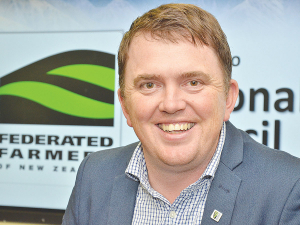Global Dairy Prices Surge with GDT Index Up 18% in 2026
Global dairy prices are on a roll, recording a fourth consecutive jump on the Global Dairy Trade (GDT) auction this year.
 Fed Farmers dairy chair Wayne Langford says rising input costs and the drop in production has taken the cream off a record milk payout.
Fed Farmers dairy chair Wayne Langford says rising input costs and the drop in production has taken the cream off a record milk payout.
The dairy season ended last week with a record milk price, but farmers aren't popping the champagne.
Milk processors will be forking out $9/kgMS or more for farmers' milk, eclipsing the record payout of 2013-14.
However, the gloss has been taken off the record milk price by high input costs and a severe drought that affected milk production - especially in Waikato and Southland.
According to NZX analyst Amy Castleton, when adjusted for inflation, Fonterra's mid-point milk price of $9.30/kgMS for last season equates to just $6.46/kgMS. Castleton says inflation "knocks quite a bit out" of the forecast payout.
Federated Farmers dairy chair Wayne Langford told Rural News that rising input costs and the drop in prodution - between 10% and 15% in some regions - has taken the cream off.
Langford syas there's a weird feeling among farmers right now - the payout is high, but they aren't seeing the extra money in their accounts.
"No one is struggling but we are missing out on that cream; the extra one or two dollars per kgMS that we should be seeing in the bank."
Langford believes the next six months will be telling for farmers.
"We will be spending 70% of our costs in the first six months of the season," he says.
These include cultivation, agri chemicals, regrassing and baleage and silage.
"I think we will really notice the full effects of the price rise then," he says.
Fonterra last month announced an opening forecast milk price range for the new season of $8.25 - $9.75/kgMS, with a midpoint of $9/kgMS.
Listed milk processor Synlait is opening with $9/kgMS. Open Country Dairy, which pays its suppliers in full four times a year, has a range of $9.40 to $9.70/kgMS for milk supplied between June and September and paid full in November.
Castleton says while the season is a good one in terms of milk price, there is a lot of turmoil. She adds that milk production remains constained and this is pushing prices up.
However, fuel, fertiliser and feed costs are soaring as a result of the Ukraine war.
Fonterra chief executive Miles Hurrell says the long-term outlook for dairy remains positive, despite recent geopolitical and Covid-19 related events impacting global demand in the short-term.
"On the supply side, growth from key milk producing regions is expected to remain constrained as high feed, fertiliser and energy costs continue to impact production volumes."
He says these demand and supply dynamics are expected to support dairy prices in the medium to long-term.
"However, we are operating in an increasingly volatile global environment and are managing a wider range of risks than usual," Hurrell adds.
Synlait chief executive Grant Watson says the 2022-23 season is starting in a good position with some product already sold at historically high prices, and foreign exchange movements supporting a strong milk price.
"Despite these two factors, the 2022-23 season final milk price will still depend on an ever-evolving global situation," says Watson.
Dairy Women's Network (DWN) has announced that Taranaki dairy farmer Nicola Bryant will join its Trust Board as an Associate Trustee.
Rural Women New Zealand (RWNZ) says it welcomes the release of a new report into pay equity.
Red meat exports to key quota markets enjoyed $1.4 billion in tariff savings in the 2024-25 financial year.
Remediation NZ (RNZ) has been fined more than $71,000 for discharging offensive odours described by neighbours as smelling like ‘faecal and pig effluent’ from its compositing site near Uruti in North Taranaki.
Two kiwifruit orchards in the Bay of Plenty and one in Northland are this year's finalists for the Ahuwhenua Trophy competition.
The Government's chief science advisor, Dr John Roche says the key objective for the science sector in the coming year is bedding down the reforms which sees the merger of the previous entities.

OPINION: A mate of yours truly reckons rural Manawatu families are the latest to suffer under what he calls the…
OPINION: If old Winston Peters thinks building trade relations with new nations, such as India, isn't a necessary investment in…